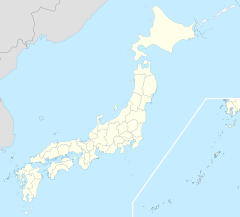This article relies largely or entirely on a single source. (August 2021) |
Ikuta Shrine (生田神社, Ikuta-jinja) is a Shinto shrine in the Chūō Ward of Kobe, Japan, and is possibly among the oldest shrines in the country.
| Ikuta Shrine 生田神社 | |
|---|---|
 Honden (Main Hall) | |
| Religion | |
| Affiliation | Shinto |
| Deity | Wakahiru-me |
| Location | |
| Location | 1-2-1 Shimoyamate-dōri, Chūō-ku, Kobe, Hyōgo prefecture |
| Geographic coordinates | 34°41′42″N 135°11′26″E / 34.69500°N 135.19056°E |
| Architecture | |
| Founder | Empress Jingū |
| Date established | 3rd century |
| Website | |
| www | |
It was founded by Empress Jingu when she returned from the Three Han (三韓, Korea) campaign.[1][2]
She was nearly shipwrecked but managed to survive thanks to praying to Watatsumi, and she made the shrine to honor him.[2] Ikasuri Shrine and Watatsumi Shrine were both also made at the same time by the Empress.[2]
History
editAccording to Nihon Shoki, it was founded by the Empress Jingū at the beginning of the 3rd century AD to enshrine the kami Wakahirume. It was one of three shrines established at this time; the others are Hirota Shrine, dedicated to Amaterasu, and Nagata Shrine, dedicated to Kotoshiro-nushi (also known as Ebisu).
During the Genpei War, parts of the Battle of Ichi-no-Tani took place in and around this shrine, and are commemorated by markers in the Ikuta forest behind the shrine. The shrine's land was much larger back then, before the city of Kobe was built around it. Thus, the precise locations of skirmishes or events can no longer be commemorated on shrine land.
Festivals and events
editToday, two Noh plays, Ebira and Ikuta Atsumori, which retell aspects of the Genpei War, are performed near the Ikuta Shrine on a regular basis. They are performed every year at Ikuta's Autumn Festival (秋祭り, Akimatsuri).
See also
editReferences
edit- ^ "Shinto shrines | Japan | Rods Shinto". shintoshrines. Retrieved 2023-04-04.
- ^ a b c "Watatsumi Shrine | 海神社 |Hyogo-ken, Kobe-shi". shintoshrines. Retrieved 2023-04-06.
External links
edit- Official website (in Japanese)
